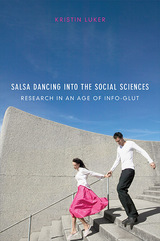
As her little boy plays at a day care center across the street, Michelle, an unmarried teenager, is in algebra class, hoping to be the first member of her family to graduate from high school. Will motherhood make this young woman poorer? Will it make the United States poorer as a nation? That's what the voices raised against "babies having babies" would have us think, and what many Americans seem inclined to believe. This powerful book takes us behind the stereotypes, the inflamed rhetoric, and the flip media sound bites to show us the complex reality and troubling truths of teenage mothers in America today.
Would it surprise you to learn that Michelle is more likely to be white than African American? That she is most likely eighteen or nineteen--a legal adult? That teenage mothers are no more common today than in 1900? That two-thirds of them have been impregnated by men older than twenty? Kristin Luker, author of the acclaimed Abortion and the Politics of Motherhood, puts to rest once and for all some very popular misconceptions about unwed mothers from colonial times to the present. She traces the way popular attitudes came to demonize young mothers and examines the profound social and economic changes that have influenced debate on the issue, especially since the 1970s. In the early twentieth century, reformers focused people's attention on the social ills that led unmarried teenagers to become pregnant; today, society has come almost full circle, pinning social ills on sexually irresponsible teens.
Dubious Conceptions introduces us to the young women who are the object of so much opprobrium. In these pages we hear teenage mothers from across the country talk about their lives, their trials, and their attempts to find meaning in motherhood. The book also gives a human face to those who criticize them, and shows us why public anger has settled on one of society's most vulnerable groups. Sensitive to the fears and confusion that fuel this anger, and to the troubled future that teenage mothers and their children face, Luker makes very clear what we as a nation risk by not recognizing teenage pregnancy for what it is: a symptom, not a cause, of poverty.

“You might think that dancing doesn’t have a lot to do with social research, and doing social research is probably why you picked this book up in the first place. But trust me. Salsa dancing is a practice as well as a metaphor for a kind of research that will make your life easier and better.”
Savvy, witty, and sensible, this unique book is both a handbook for defining and completing a research project, and an astute introduction to the neglected history and changeable philosophy of modern social science. In this volume, Kristin Luker guides novice researchers in: knowing the difference between an area of interest and a research topic; defining the relevant parts of a potentially infinite research literature; mastering sampling, operationalization, and generalization; understanding which research methods best answer your questions; beating writer’s block.
Most important, she shows how friendships, non-academic interests, and even salsa dancing can make for a better researcher.
“You know about setting the kitchen timer and writing for only an hour, or only 15 minutes if you are feeling particularly anxious. I wrote a fairly large part of this book feeling exactly like that. If I can write an entire book 15 minutes at a time, so can you.”
READERS
Browse our collection.
PUBLISHERS
See BiblioVault's publisher services.
STUDENT SERVICES
Files for college accessibility offices.
UChicago Accessibility Resources
home | accessibility | search | about | contact us
BiblioVault ® 2001 - 2024
The University of Chicago Press









